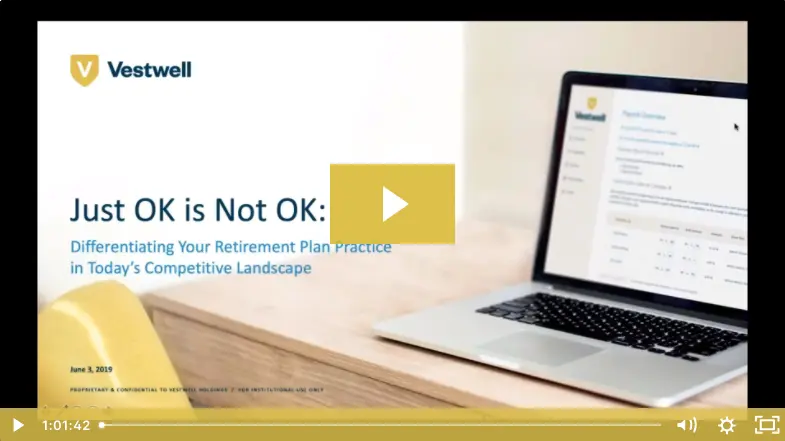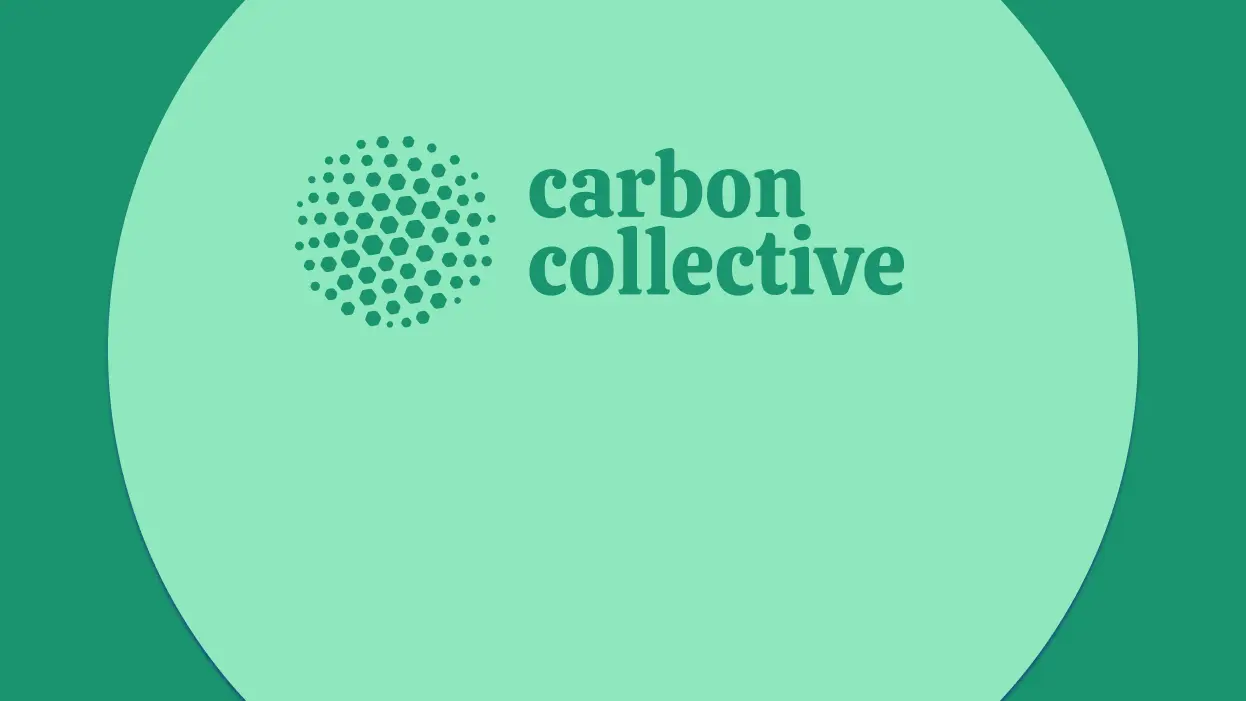
Just OK is Not OK: Differentiating Yourself in Today’s Competitive Landscape
90% of plan sponsors with 50-10,000 employees rely on an advisor for their defined contribution plans. But while plan sponsors are typically not interested in overseeing funds and doing recordkeeper selection, they are increasingly recognizing the importance of retirement and the fiduciary responsibilities that come with it. So with plan sponsors looking beyond cost, how can advisors effectively differentiate themselves?
That’s exactly what we explored in a panel entitled Just OK is Not OK: Differentiating Your Retirement Plan Practice in Today’s Evolving Market. According to Fred Barstein (401k TV), Jania Stout (HighTower Advisors) and Aaron Shumm (Vestwell), differentiating your practice is no longer about just the 3 F’s - fees, funds, and fiduciary guidance - but about finding new ways to add value to an increasingly aware client base.
This is particularly difficult thanks to a confluence of factors. There’s new technology that’s upping the game for how advisors scale their practices and support their clients and sifting through those is no small feat; there are rising costs forcing providers to look for additional revenue streams, many of which pit them against advisors; there are turf wars over data (and ultimately, over clients!) which also drive advisors to rethink who their friends are; and there’s in- creased litigation, which is shedding light on not just being a fiduciary, but on upholding those responsibilities as well.
So what can the modern day advisor do to stand out? According to a panel, there are 4 key things.
1. Define and Defend Your Value
- Fees - Fees are going down all over the place and advisors are continually getting asked to do more or the same at a lower price. This means that defending your fee structure is not about saying you’re going to deliver value, but about showing it. HighTower, for example, does a read-out report every year to show the positive results they’ve brought to their clients. Furthermore, they share the things they’re doing to benefit the plan and its participants on an ongoing basis.
- Robos - When it comes to technology, we’d be kidding ourselves if we don’t think it’s the way of the future. Howev- er, by no means does that translate to robos taking over the role of the advisor. One thing technology won’t ever be able to bring to the table is empathy, so it’s important to play up your emotional intelligence and highlight the intangi- ble benefits you provide. All the while, it’s also important not to overlook the value of technology. Embrace it and the opportunities it can bring to your business rather than fear it as a threat.
- Lower-cost peers (where you believe you provide more value) - Since most advisors are going to check the same boxes in an RFP, cost can often be a key differentiator. That being said, if you believe you’re bringing more to the ta- ble and worth the larger price tag, it’s OK to hold strong. Instead, find ways to defend your value, particularly through case studies. Essentially, don’t tell them what you do, show them what you do.
Most importantly, when it comes to defining and defending your value don’t fake it. Plans are sold, not bought, so be authentic and build the trusting relationship your clients deserve. For example, if financial wellness isn’t your thing, don’t pretend like it is; instead, partner with someone who is great at it. Meaning, play up your true strengths and show prospective and current clients that you’re resourceful enough to fill in any gaps.
2. Identify the Right Tools, Technologies, and Partnerships
- Tools - It’s important to identify tools that help you effectively scale your business. Everything from data aggregation to reporting to ongoing client communication takes a great deal of time and investment. Finding tools that help you more efficiently provide customized service - without hiding data critical to your client’s success - will have a big impact.
- Technologies - These days, plan sponsors are looking for integrated solutions and expecting everything to be solved at a plan level. Therefore, it’s important for the technologies you utilize to feel in sync. It’s also important that any technology you bring in makes not only your life easier, but your client’s life as well. Everything from onboarding through legal & compliance and beyond should happen in a seamless way so your client feel taken care of and not commoditized.
That being said, it’s always easier said than done to integrate technology. It’s critical to understand what was built and how because appearances are not always reality. One such “how” is cybersecurity which has become an increasingly hot topic with plan sponsors. Some advisory firms are even having their recordkeepers fill out a cyber audit given its importance. As an advisor, if you’re not asking questions to ensure your technologies have the right controls in place, it could become a fiduciary issue. - Partnerships - Ultimately, your role is to make your clients lives easier. You need to be able to solve all their most pressing problems, and if you can’t do that directly, you need to identify the right partners that can. There will inevitably be blurred lines in this industry - the advisor, the recordkeeper, the TPA - because there’s a great deal of overlap. So it’s especially important to find partners who can grow with you, not compete with you.
3. More Effectively Engage Your Clients
- Data is critical - When you think about engaging your clients, the ability to share data that matters to them is paramount. So while providers might have extensive out-of-the-box reporting, be sure to partner with a recordkeeper who can give you the data that’s most important to your clients - brownie points for customization!
- Educate, educate, educate - Educating your clients isn’t just about what’s important, but also about why it’s important. If you don’t explain the “why,” then clients don’t always know what to look for and aren’t equipped to make the best short and long term decisions for their company.
- But be efficient - Particularly when engaging with committees, it’s important not to lose them with lengthy pre- sentations. You don’t have to try to do everything all in one meeting. In fact, you don’t even have to hold all meetings live! Video is a great, efficient way to meet with them. Additionally, not all education has to come from you and your firm - you can borrow content from other providers who do it well. It’s all about ensuring your clients receive resonant, plain english information that will help them do their job best.
- Remind your clients that you’re their advocate - Oftentimes plan sponsors don’t know what’s happening be- hind the scenes. It’s amazing how much work we all do to make sure a plan runs smoothly, but if you’re only meeting with the client twice per year, you need to find ways to show them what you’ve been doing day-to-day. HighTower, for example, highlight all the things they’ve done for their clients on the first page of each quarterly report.
4. Market with Impact
- Don’t “sell,” “educate" - Make sure people understand what they’re buying and the impact it can have on their business. As an advisor, you need to be having the conversations that technology alone can’t offer because they can’t get to know your prospects on the same human level. Additionally, you need to be able to distinguish your role from the recordkeeper, and education is a big part of that. Find good partners who don’t compete with you for business, and it will be easier to highlight what everyone brings to the table.
- Brand yourself - This is a trust industry, so if clients trust your brand, that’s the best marketing tool you can have. Social media is great for this. Advisors aren’t always the most active on social media, so any engagement is a good start. Share your own thoughts - or thoughts of industry leaders you admire - with specific groups, or even targeted individuals. Be sure to connect with any relevant contacts you come across so you have access to a more expansive network. Even consider a hashtag or some identifier that represents who you are as a brand and use that in all posts. But most importantly...be authentic.
- Don’t cut corners - If you’re going out to meet with a company, know who you’ll be in front of - their past roles, previous 401(k) providers, previous advisors, and more. Your entire team should go in educated and prepared.
- Consider changing your fee structure - Flat fees are making their mark. This is because advisors are starting to position themselves as a true consultant to the business. As an Outside Chief Retirement Officer, so to speak, advisors should come to the table with knowledge on all things retirement including financial wellness and other long-term investment offerings. If you consider how much it would cost a provider to hire an ERISA and retirement specialist, you can really showcase the value you’re bringing to the table.
- Engage senior management - A big reason that’s holding back dramatic improvement in retirement security is that we haven’t engaged senior management enough in retirement plans. We need them to see the long term effects of retirement readiness and the impact a good plan can have on recruitment and retention.
So while plan sponsors may not want to become experts on retirement plans and all of the minutia involved, they know enough to be dangerous. This means advisors - specialists or not - need to truly differentiate themselves in distinctive ways to stand out from their peers. Because at the end of the day, just OK is not OK.








